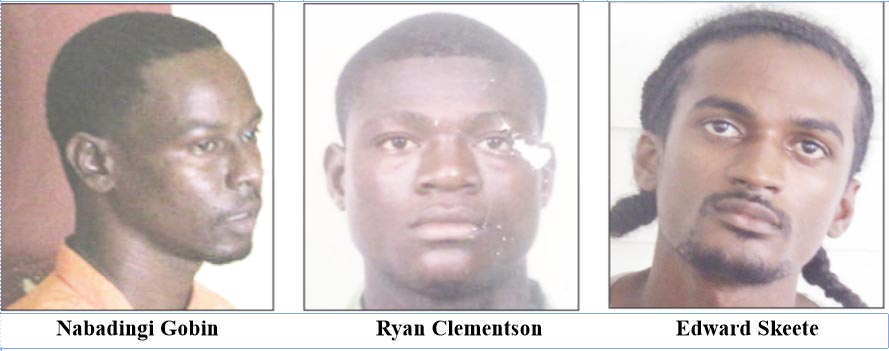Edward Skeete and Nabadingi Gobin were yesterday morning freed of the murder of Ryan Clementson, who was reportedly shot near the Turning Point Snackette in Tucville in July, 2015.
The charge against Skeete, known as “Pretty Boy,” and Gobin, called “Dangles,” was that they murdered Clementson on July 24th, 2015.
At the conclusion of a voir dire, which was being conducted during their trial, Justice Navindra Singh ruled that the state had presented insufficient evidence against the men for the capital indictment.
In the circumstances, the judge directed the jury to return formal not guilty verdicts, thereby setting the smiling men free.
Prosecutor Narissa Leander, however, gave notice of the state’s intention to appeal.
To both men, the judge explained that he was duty-bound to discharge them on grounds of insufficiency of evidence. He, however, admonished them to stay out of trouble and to avoid getting into any further brushes with the law.
He noted that they have to be true to themselves as they alone know whether they were, or were not involved in the crime—a burden with which they each would have to live.
While Skeete’s handcuffs and shackles were immediately removed, the judge informed that the receipts which Gobin said had been issued to his family after he was granted bail on pending firearm and ammunition charges, had to be presented to the court for his release.
With his relatives unable to locate the receipts by the time the judge left the bench, Gobin was remanded into the custody of the police. The court informed, however, that the receipts can be produced at any subsequent time to the police outpost at the High Court in Georgetown.
In her opening address, at the commencement of the trial, Prosecutor Tiffini Lyken had said that while Clementson was shot on July 14th, he succumbed to his injuries 10 days later at the Georgetown Public Hospital.
Lance Corporal Colwyn Major had testified to accompanying Clementson on the journey to the hospital, during which he said he questioned the injured man about who had shot him and he mentioned a name and thereafter related “something,” as a result of which he (Major), contacted a person by the name of Ayodella Solomon.
According to the Lance Corporal, he saw Solomon, who was also at the hospital that night, and he too related “something” to him. The policeman said he observed what appeared to be a gunshot wound on Solomon’s right shoulder.
Also testifying was Sergeant Akeem Lewis, who also said that he had questioned Clementson regarding who had shot him.
Lewis told the court that he had visited the now dead man while he was still a patient of the hospital, and during an interview, he, (Clementson), when asked, mentioned the names and aliases of three persons, whom he said inflicted the injuries on him.
It was at this point of the proceedings that a voir dire commenced. Also testifying at the trial was retired Inspector of Police and Ballistics Expert Eon Jackson, who recalled examining a spent shell and ammunition which he said were submitted to him for analysis by Detective Corporal Carlson Rockliffe.
When asked by Waldron whether the items he submitted to Jackson had been tested for fingerprints, Rockliffe, also a Crime Scene Examiner, answered in the negative.
Pathologist Dr Nehaul Singh had given Clementson’s cause of death as pulmonary thromboembolism, due to multiple injuries.
He had explained to the court that a blood clot had developed in Clementson’s leg, which travelled to his heart.
The doctor noted that at the time of performing the autopsy, he was told of the patient’s clinical history of having sustained a gunshot wound to his right eye.
Responding to questions under cross-examination, however, the pathologist clarified that he had found no evidence of a gunshot wound, nor did he find or extract any foreign object from the body. He told Waldron, when asked, that it was possible that one of the man’s major arteries could have been severed as a result of clinical intervention.
Skeete was represented by attorney Nigel Hughes.
The state’s case was presented by Leander, in association with Lyken and attorney Abigail Gibbs.





